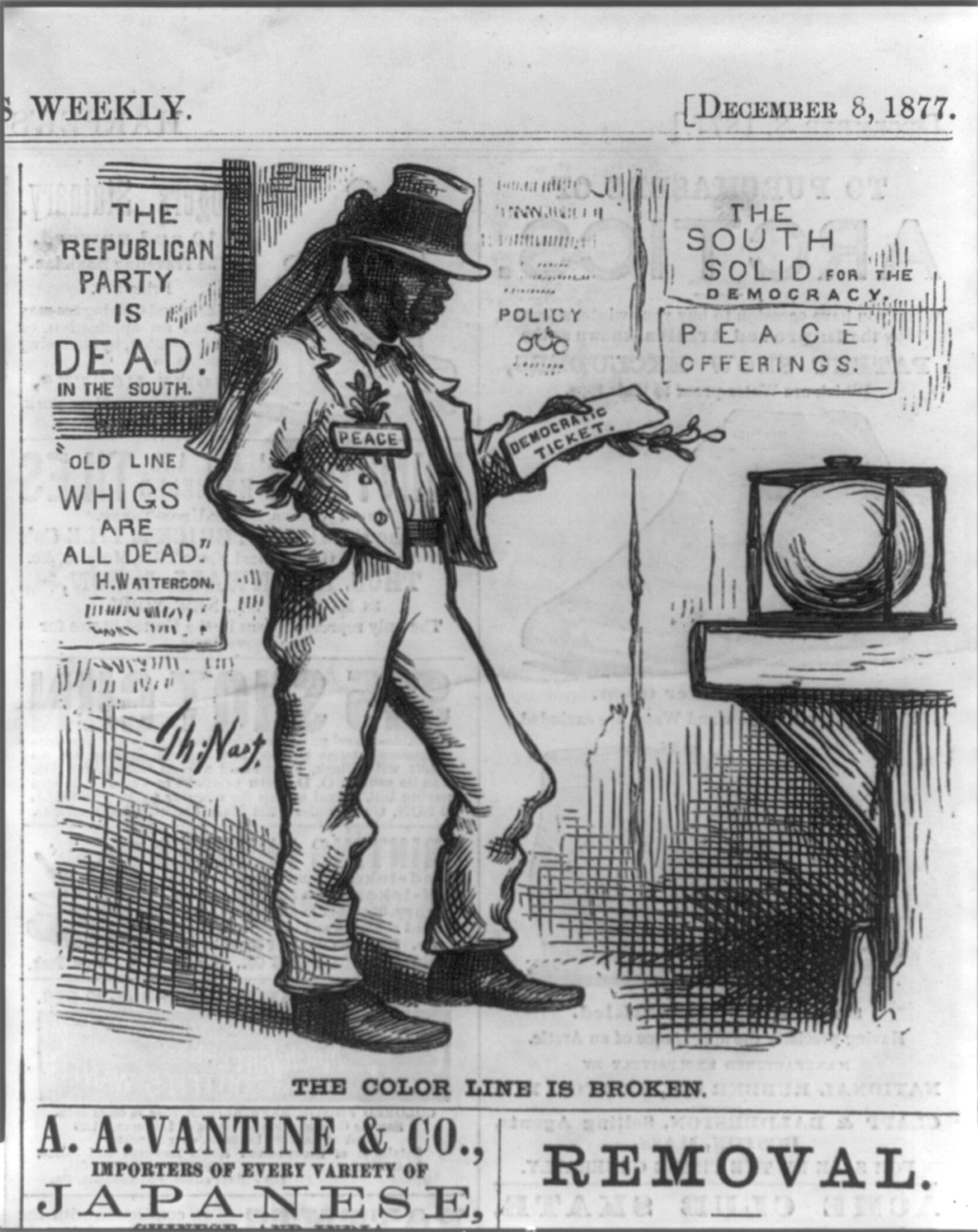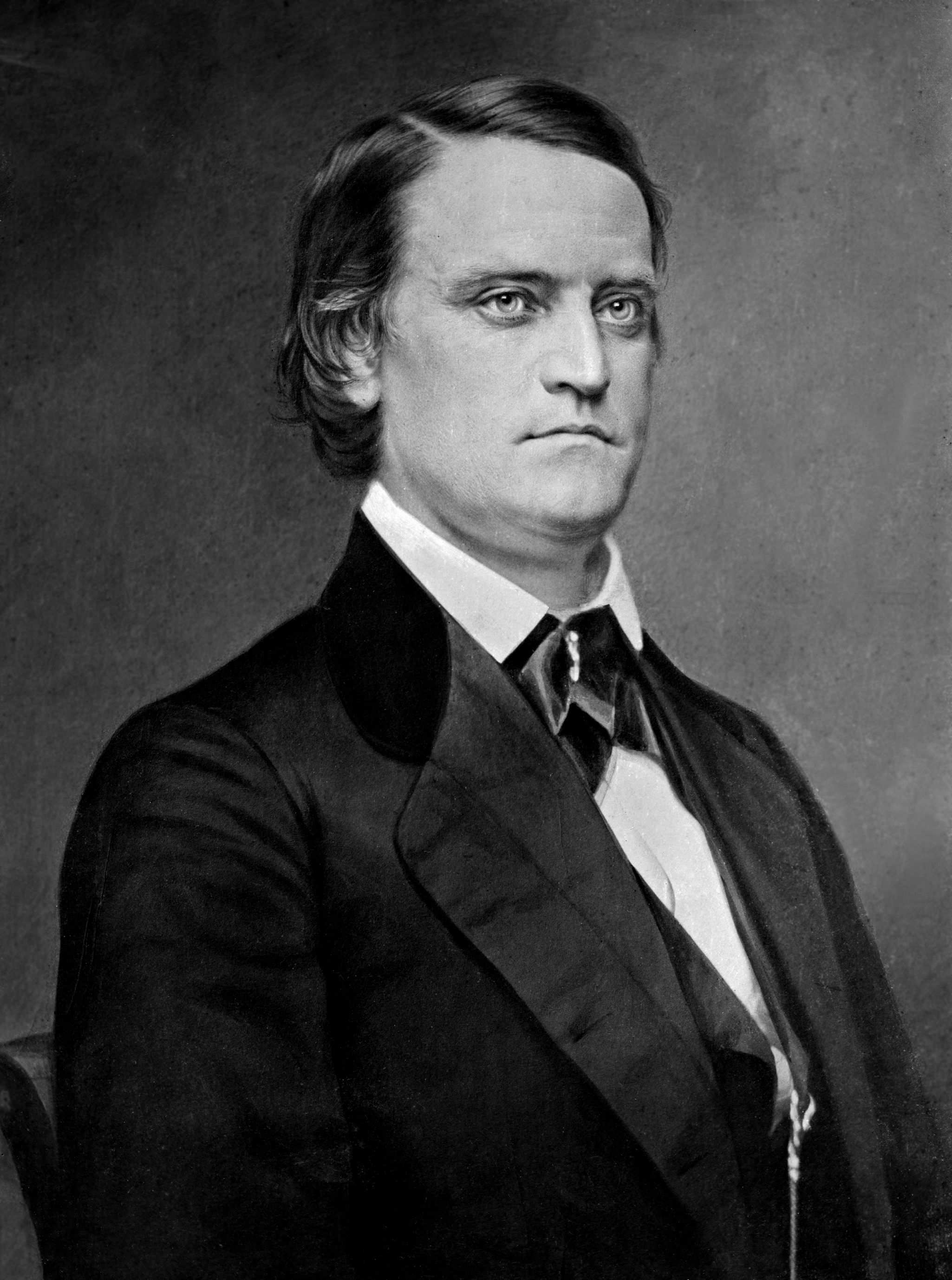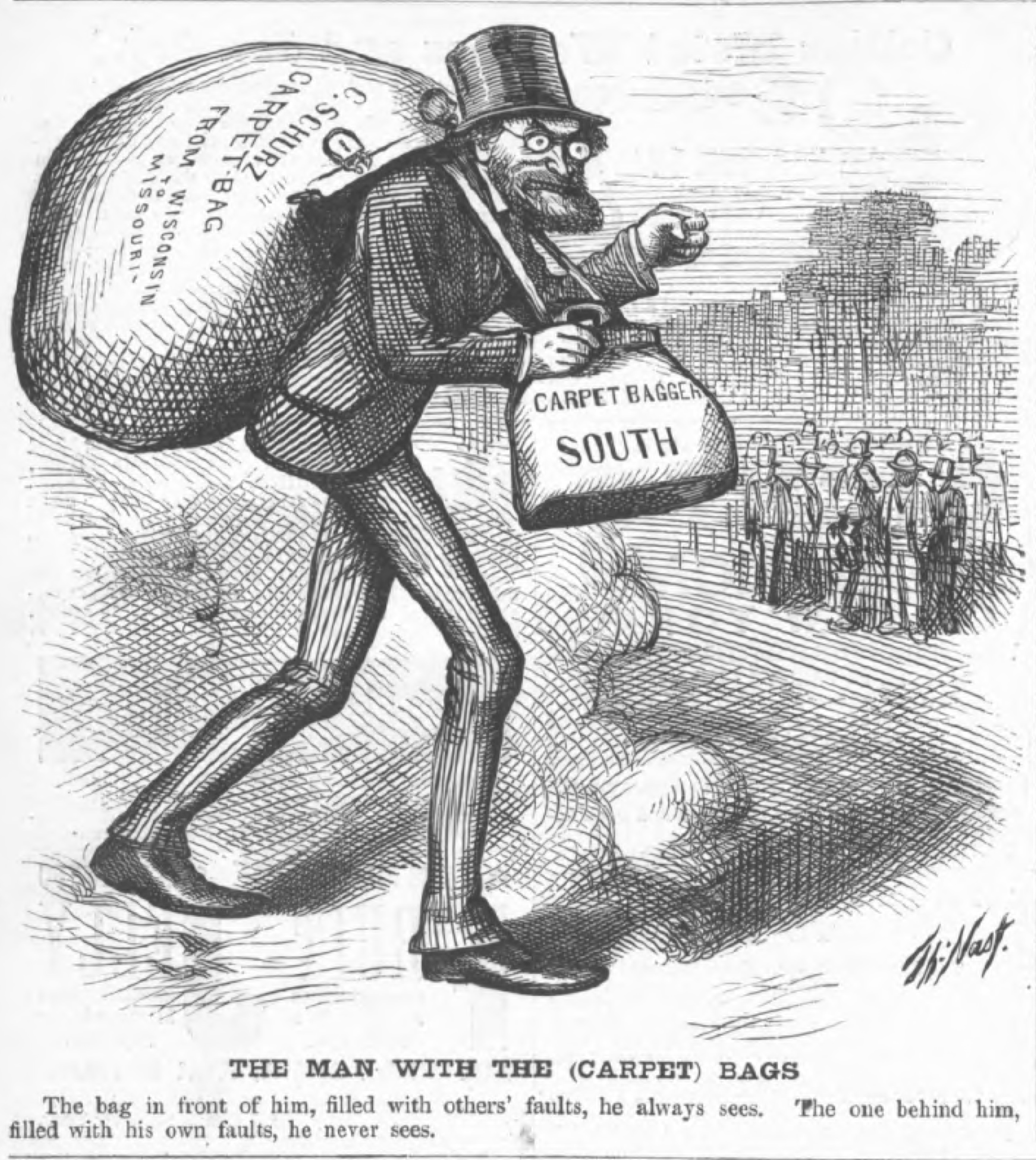|
Redeemers
The Redeemers were a political coalition in the Southern United States during the Reconstruction Era that followed the Civil War. Redeemers were the Southern wing of the Democratic Party. They sought to regain their political power and enforce white supremacy. Their policy of Redemption was intended to oust the Radical Republicans, a coalition of freedmen, " carpetbaggers", and " scalawags". They generally were led by the White yeomanry and they dominated Southern politics in most areas from the 1870s to 1910. During Reconstruction, the South was under occupation by federal forces, and Southern state governments were dominated by Republicans, elected largely by freedmen and allies. Republicans nationally pressed for the granting of political rights to the newly-freed slaves as the key to their becoming full citizens and the votes they would cast for the party. The Thirteenth Amendment (banning slavery), Fourteenth Amendment (guaranteeing the civil rights of former slaves and ... [...More Info...] [...Related Items...] OR: [Wikipedia] [Google] [Baidu] |
Southern Democrats
Southern Democrats, historically sometimes known colloquially as Dixiecrats, are members of the U.S. Democratic Party who reside in the Southern United States. Southern Democrats were generally much more conservative than Northern Democrats with most of them voting against the Civil Rights Act of 1964 by holding the longest filibuster in the American Senate history while Democrats in non-Southern states supported the Civil Rights Act of 1964. After 1994 the Republicans typically won most elections in the South. In the 19th century, Southern Democrats were people in the South who believed in Jacksonian democracy. In the 19th century, they defended slavery in the United States, and promoted its expansion into the West against northern Free Soil opposition. The United States presidential election of 1860 formalized the split in the Democratic Party and brought about the American Civil War. Stephen Douglas was the candidate for the Northern Democratic Party, and John C. Breckinrid ... [...More Info...] [...Related Items...] OR: [Wikipedia] [Google] [Baidu] |
Wade Hampton III
Wade Hampton III (March 28, 1818April 11, 1902) was an American military officer who served the Confederate States of America during the American Civil War and later a politician from South Carolina. He came from a wealthy planter family, and shortly before the war he was one of the largest slaveholders in the Southeast as well as a state legislator. During the American Civil War, he served in the Confederate cavalry, where he reached the rank of lieutenant general. At the end of Reconstruction, with the withdrawal of federal troops from the state, Hampton was leader of the Redeemers who restored white rule. His campaign for governor was marked by extensive violence by the Red Shirts, a paramilitary group that served the Democratic Party by disrupting elections and suppressing black and Republican voting in the state. He was elected Governor, serving 1876 to 1879. After that, he served two terms as U.S. Senator, from 1879 to 1891. Early life and career Wade Hampton III ... [...More Info...] [...Related Items...] OR: [Wikipedia] [Google] [Baidu] |
Protestantism
Protestantism is a Christian denomination, branch of Christianity that follows the theological tenets of the Reformation, Protestant Reformation, a movement that began seeking to reform the Catholic Church from within in the 16th century against what its followers perceived to be growing Criticism of the Catholic Church, errors, abuses, and discrepancies within it. Protestantism emphasizes the Christian believer's justification by God in faith alone (') rather than by a combination of faith with good works as in Catholicism; the teaching that Salvation in Christianity, salvation comes by Grace in Christianity, divine grace or "unmerited favor" only ('); the Universal priesthood, priesthood of all faithful believers in the Church; and the ''sola scriptura'' ("scripture alone") that posits the Bible as the sole infallible source of authority for Christian faith and practice. Most Protestants, with the exception of Anglo-Papalism, reject the Catholic doctrine of papal supremacy, ... [...More Info...] [...Related Items...] OR: [Wikipedia] [Google] [Baidu] |
Yeoman
Yeoman is a noun originally referring either to one who owns and cultivates land or to the middle ranks of servants in an English royal or noble household. The term was first documented in mid-14th-century England. The 14th century also witnessed the rise of the yeoman longbow archer during the Hundred Years' War, and the yeoman outlaws celebrated in the Robin Hood ballads. Yeomen also joined the English Navy during the Hundred Years' War as seamen and archers. In the early 15th century, yeoman was the rank of chivalry between page and squire. By the late 17th century, yeoman became a rank in the new Royal Navy for the common seamen who were in charge of ship's stores, such as foodstuffs, gunpowder, and sails. References to the emerging social stratum of wealthy land-owning commoners began to appear after 1429. In that year, the Parliament of England re-organized the House of Commons into counties and boroughs, with voting rights granted to all freeholders. The Act of 14 ... [...More Info...] [...Related Items...] OR: [Wikipedia] [Google] [Baidu] |
Scalawag
In United States history, the term scalawag (sometimes spelled scallawag or scallywag) referred to white Southerners who supported Reconstruction policies and efforts after the conclusion of the American Civil War. As with the term ''carpetbagger'', the word has a long history of use as a slur in Southern partisan debates. The post-Civil War opponents of the scalawags claimed they were disloyal to traditional values and white supremacy.Ted Tunnell. 2006. Creating "The Propaganda of History": Southern Editors and the Origins of "Carpetbagger and Scalawag". The Journal of Southern History , Vol. 72, No. 4 (Nov., 2006), pp. 789–822 Scalawags were particularly hated by 1860s–1870s Southern Democrats, who called Scalawags ''traitors to their region'' (long known for its widespread chattel slavery). Prior to the Civil War, most Scalawags had been opposed to the southern states' (the Confederacy's) secession from the United States. The term is commonly used in historical stud ... [...More Info...] [...Related Items...] OR: [Wikipedia] [Google] [Baidu] |
Carpetbagger
In the history of the United States, carpetbagger is a largely historical term used by Southerners to describe opportunistic Northerners who came to the Southern states after the American Civil War, who were perceived to be exploiting the local populace for their own financial, political, and/or social gain. The term broadly included both individuals who sought to promote Republican politics (including the right of African Americans to vote and hold office) and individuals who saw business and political opportunities because of the chaotic state of the local economies following the war. In practice, the term ''carpetbagger'' was often applied to any Northerners who were present in the South during the Reconstruction Era (1865–1877). The term is closely associated with " scalawag", a similarly pejorative word used to describe native white Southerners who supported the Republican Party-led Reconstruction. White Southerners commonly denounced "carpetbaggers" collectively dur ... [...More Info...] [...Related Items...] OR: [Wikipedia] [Google] [Baidu] |
Freedman
A freedman or freedwoman is a formerly enslaved person who has been released from slavery, usually by legal means. Historically, enslaved people were freed by manumission (granted freedom by their captor-owners), emancipation (granted freedom as part of a larger group), or self-purchase. A fugitive slave is a person who escaped enslavement by fleeing. Ancient Rome Rome differed from Greek city-states in allowing freed slaves to become plebeian citizens. The act of freeing a slave was called ''manumissio'', from ''manus'', "hand" (in the sense of holding or possessing something), and ''missio'', the act of releasing. After manumission, a slave who had belonged to a Roman citizen enjoyed not only passive freedom from ownership, but active political freedom ''(libertas)'', including the right to vote. A slave who had acquired ''libertas'' was known as a ''libertus'' ("freed person", feminine ''liberta'') in relation to his former master, who was called his or her patron ... [...More Info...] [...Related Items...] OR: [Wikipedia] [Google] [Baidu] |
Radical Republican
The Radical Republicans (later also known as "Stalwarts") were a faction within the Republican Party, originating from the party's founding in 1854, some 6 years before the Civil War, until the Compromise of 1877, which effectively ended Reconstruction. They called themselves "Radicals" because of their goal of immediate, complete, and permanent eradication of slavery, without compromise. They were opposed during the War by the Moderate Republicans (led by President Abraham Lincoln), and by the pro-slavery and anti-Reconstruction Democratic Party. Radicals led efforts after the war to establish civil rights for former slaves and fully implement e ... [...More Info...] [...Related Items...] OR: [Wikipedia] [Google] [Baidu] |
White Supremacy
White supremacy or white supremacism is the belief that white people are superior to those of other races and thus should dominate them. The belief favors the maintenance and defense of any power and privilege held by white people. White supremacy has roots in the now-discredited doctrine of scientific racism and was a key justification for European colonialism. As a political ideology, it imposes and maintains cultural, social, political, historical, and/or institutional domination by white people and non-white supporters. In the past, this ideology had been put into effect through socioeconomic and legal structures such as the Atlantic slave trade The Atlantic slave trade, transatlantic slave trade, or Euro-American slave trade involved the transportation by slave traders of enslaved African people, mainly to the Americas. The slave trade regularly used the triangular trade route and ..., Jim Crow laws in the United States, the White Australia policy, White ... [...More Info...] [...Related Items...] OR: [Wikipedia] [Google] [Baidu] |
American Civil War
The American Civil War (April 12, 1861 – May 26, 1865; also known by other names) was a civil war in the United States. It was fought between the Union ("the North") and the Confederacy ("the South"), the latter formed by states that had seceded. The central cause of the war was the dispute over whether slavery would be permitted to expand into the western territories, leading to more slave states, or be prevented from doing so, which was widely believed would place slavery on a course of ultimate extinction. Decades of political controversy over slavery were brought to a head by the victory in the 1860 U.S. presidential election of Abraham Lincoln, who opposed slavery's expansion into the west. An initial seven southern slave states responded to Lincoln's victory by seceding from the United States and, in 1861, forming the Confederacy. The Confederacy seized U.S. forts and other federal assets within their borders. Led by Confederate President Jefferson ... [...More Info...] [...Related Items...] OR: [Wikipedia] [Google] [Baidu] |
Reconstruction Era Of The United States
The Reconstruction era was a period in American history following the American Civil War (1861–1865) and lasting until approximately the Compromise of 1877. During Reconstruction, attempts were made to rebuild the country after the bloody Civil War, bring the former Confederate states back into the United States, and to redress the political, social, and economic legacies of slavery. During the era, Congress abolished slavery, ended the remnants of Confederate secession in the South, and passed the 13th, 14th, and 15th Amendments to the Constitution (the Reconstruction Amendments) ostensibly guaranteeing the newly freed slaves (freedmen) the same civil rights as those of whites. Following a year of violent attacks against Blacks in the South, in 1866 Congress federalized the protection of civil rights, and placed formerly secessionist states under the control of the U.S. military, requiring ex-Confederate states to adopt guarantees for the civil rights of freed ... [...More Info...] [...Related Items...] OR: [Wikipedia] [Google] [Baidu] |
Southern United States
The Southern United States (sometimes Dixie, also referred to as the Southern States, the American South, the Southland, or simply the South) is a geographic and cultural region of the United States of America. It is between the Atlantic Ocean and the Western United States, with the Midwestern and Northeastern United States to its north and the Gulf of Mexico and Mexico to its south. Historically, the South was defined as all states south of the 18th century Mason–Dixon line, the Ohio River, and 36°30′ parallel.The South . ''Britannica.com''. Retrieved June 5, 2021. Within the South are different , such as the [...More Info...] [...Related Items...] OR: [Wikipedia] [Google] [Baidu] |









